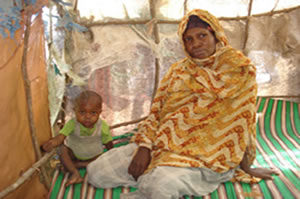fiogf49gjkf0d
by Mohamed Mukhtar
Thursday, September 25, 2008


 |
|
Photo source: Abdisamad Farah, IRIN |
As you read this article you are likely to be in a room with a comfortable temperature, lack of security is not your concern, a trip to the kitchen or nearby restaurant is all you require to have a meal, rain along the way may be a minor inconvenience and if you feel the call of nature a toilet is around the corner.
Now, picture this and compare it with your world. You fled from your home when it had become a theatre of war and reached a refugee camp which you were led to believe would provide food and shelter. Once you reached the camp you discovered that there were no food rations, you had missed the last distribution and the next one would be weeks if not a month away. You were surrounded by your eight children who were too weak to cry, neighbours were too poor to afford food and you were too drained to care. Somehow, you managed to construct a makeshift house out of sticks and tattered sheets but heavy downpours washed your humble house away. The children were exposed to 18 hours of rain. You put your arms around some of your children to comfort them; the weakest two hid their heads on your chest as if they were trying to burrow right into you but their weak bodies could not withstand the force of the heavy rain and died on your lap.
This is not an imaginary situation. This is reality for Nuurto Aweys. Hunger, insecurity, and despair combine in her weak body as she relates her story. She sits despondently in a makeshift shelter in a camp for displaced people outside Mogadishu. Extreme poverty and worry have taken their toll on her health and the lines on her face tell you all you need to know. Her 30 years of life have not prepared her for what she is facing now.
In June 2008, Nuurto and her children joined the hundreds of thousands of people fleeing Mogadishu following Ethiopia’s invasion of Somalia. Unable to travel far, they became part of the mass of internally displaced people living in displacement camps along a road which links Mogadishu to Afgooye.
Nuurto speaks to IRIN about her predicament: “We used to live in Yaaqshid [north Mogadishu] in a part of the district that was not so bad compared with other places. Besides, we had no money to flee. Everything I made in the market we ate, so we had nothing left. Three months ago, there was so much fighting resulting in the deaths of many people in my area that I decided it was not possible to stay. I could not go out to do the odd jobs I used to do to earn some money and my children were slowly starving. I heard that many people went to Arbiska and were safe and were being helped. So since we did not have money for transport, we walked to Arbiska”
Reality at the camp was contrary to Nuurto’s expectation. Insecurity has forced many aid agencies to leave Somalia and as a result displaced people are facing extreme shortages of food, shelter and other essentials. To survive, Nuurto says, “I go out into the fields and collect Kable and Bukurey [wild foliage] to cook for the children. It is not food but when you are hungry you will eat anything that does not eat you.” People do not only go nearby bushes to find something to eat but also go to relieve themselves since there are not enough latrines in these settlements.
Nuurto believes that two of her children would not have died if she had had plastic to cover her flimsy shelter. She says, “"We built a makeshift shelter and were hoping to get plastic sheeting to cover it to protect us from the rains. However, the rains last week [4-6 September] were so heavy they washed everything away. We were sitting in an open area for over 18 hours with the rains coming down hard. My children were already weak, but Awliyo [a two-year-old girl] and Mohamed [a three-year-old boy] were the weakest. They had been ill and so died in the rain. When the rains came, we had nowhere to shelter and they just died.”
Security remains a fantasy for Nuurto and others. The road between Mogadhishu and Afgooye does not offer the safety that internally displaced people are looking for but they are too weak and too poor to move again. This road is not only an artery for displaced people and humanitarian organisations but also for Ethiopian troops as they have different army positions along the road. Those who appose the Ethiopian presence in Somalia launch almost daily attacks against Ethiopian forces and Ethiopians shoot anyone who happens to be in their line of vision.
Life remains bleak for Nuurto and many people like her. She utters “My life in Mogadishu was very hard but this one is worse. Even with all the fighting I had all my children, now two are gone. I don’t know when all this suffering will stop. God will help us.”
Mohamed Mukhtar
[email protected]